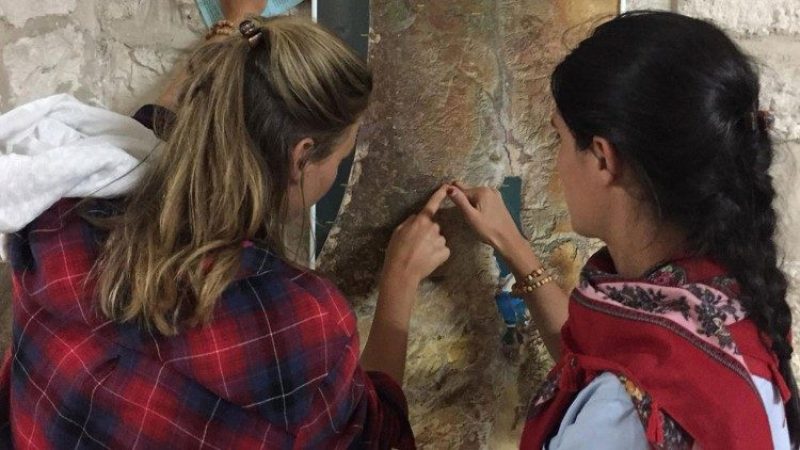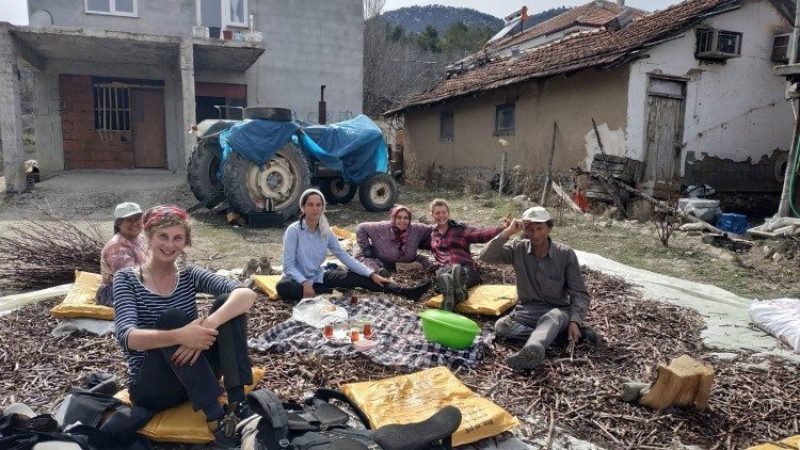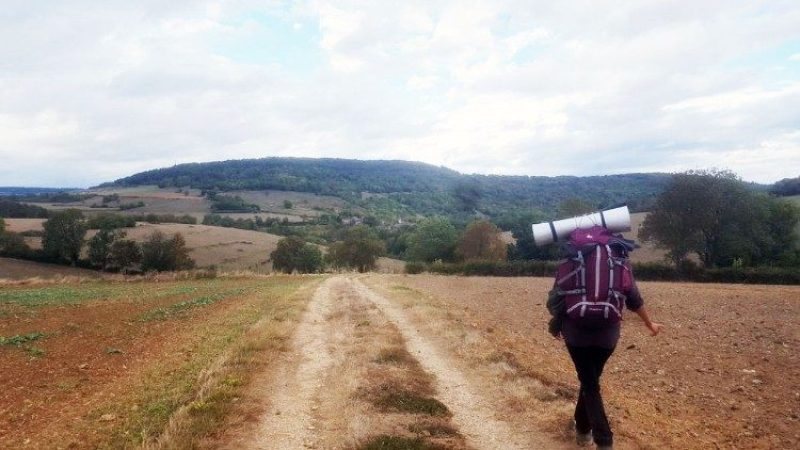
5,000 KM ON FOOT: THANKS BE TO GOD
Jean Charles Putzolu, Jerusalem
06/06/2019

Guillemette and Camille, pointing out Jerusalem on a map, after arriving in the Holy City
The adventure began in Paris. Camille Desveaux had this project in her head since she was 14 years old. It was a dream, locked in a drawer, one she never talked about with anyone. Three years ago, she decided to share the dream with her parents. It didn't take long to convince them, but it would still be a while before she could leave. Meanwhile, Camille met Guilemette de Nortbecourt at university. They got along well and a friendship was born. Camille chose not to tell Guillemette anything about her project until they were renting an apartment together, after finishing their studies. When Camille did tell Guillemette, she understood they were both looking for the same thing. "At the same time, I was also looking for the absolute: I was thirsty for God. Camille was providential”. The idea of this pilgrimage on foot surfaced thanks to a priest, Fr Louis Hervé Guiny. Camille had no doubt about her own spiritual search, but her project was intended for one person, not two. It took them a week to straighten out the details. Then they decided, and left.
Notre Dame de Paris
Monday, 10 September 2018, 8.00am. They asked their priest friend, who accompanied the initiative spiritually, to celebrate Mass for their departure. Their families were there too: Camille’s three sisters and four of Guillemette’s ten brothers. They left straight after Mass, followed by the watchful and slightly worried eyes of their relatives.
They spent the first four days not far from Paris, making scheduled stops at the homes of friends and acquaintances. They still didn’t quite realize what this adventure held in store for them. It was on the morning of the fifth day, that they ventured into the unknown. They had no idea where they would sleep that night and, most importantly, they had not a single coin in their pockets. "It was a conscious choice", says Guillemette, "we wanted to strip ourselves of everything and abandon ourselves to God's will alone, because He is the one who made this journey possible”. They eventually arrived at a small village in the Loiret region, where they saw a castle: "It must be full of free rooms", they thought, as they walked up to the front door.

The humiliation of begging
This was still only day five and, for the first time, they had to ask for hospitality from a perfect stranger. Their request was rejected, politely, but it was rejected. They realized how humiliating it can be to beg. But they were determined, and not for a moment did they think of giving up. They knocked on another door that was opened by an open heart. According to Camille, they learned a lot from these encounters. “We were surprised by the extraordinary goodness of these people. Sometimes goodness hides at the bottom of our hearts and just has to find a way out". Veronica opened her home to them. In fact, she left the two girls alone in the house because she had already planned to go out and see a show. Camille and Guillemette settled down for the night. Next morning, over breakfast, they had time to get to know their hostess better.
Another evening, after crossing Switzerland, the Italian Alps, Slovenia and Croatia, they arrived in Bosnia Herzegovina. There they were welcomed by Pierre, an 80-year-old Serb with years of hard work behind him. He could not speak any foreign language. Fortunately, his daughter Slavica knew a few words of English, at least enough to understand each other. Pierre agreed to host the two girls. "He offered us a single bed," explains Camille. "When we woke up the next day, we noticed he had slept on the couch and left us his bed. I don't know if I could have done the same thing”.
Balkan winter
Guillemette's father is a soldier. He had warned the girls of the rough winter they could expect in the Balkans. During the period of their pilgrimage, between November 2018 and February 2019, temperatures were exceptionally mild: never below -12° and accompanied by a succession of extraordinary landscapes. Guillemette remembers when they were in Bulgaria, for example: “We spent a day with our feet in the snow and our heads in the sun. The landscape before us inspired us to contemplate and to give thanks to God”.
Turkey
Cultural differences can create problems for two girls on their own, accompanied only by their 10-kilo backpack and a good pair of shoes. No one was ever aggressive towards them, and they never feared for their safety, but they did have to put up with the stares of men. Two girls on their own can also be misunderstood: "They thought we were prostitutes", says Guillemette. "We had to change our approach and stop smiling at everyone we met”. Turkey was one of the more challenging stops on their journey, even if they found extraordinary signs of generosity there.
Churches, place of welcome
They found more than one door closed to them. But that meant nothing after the reception they were given by Catholic churches in France and Italy, the Catholic and Protestant churches in Switzerland, and the Orthodox churches later on in their journey. "Every time, in the parishes, we truly lived the culture of hospitality". From Serbia to Greece, when the language barrier became a problem, and when they could not host them personally, some Orthodox popes wrote letters of introduction for them to explain their project: these letters were like a real passport.
They were also welcomed in Muslim villages. They would always knock at the door of the head of the village first. He would either host the girls himself, or help them find room and board at the home of some other member of the community. In their 248 nights of pilgrimage, they never slept without a roof over their heads.
Village humanity
This was the thread that tied their adventure together. Camille and Guillemette had only one smartphone, which they used to send messages to their parents, in order to reassure them. As they continued to meet new people, the list of contacts on their phone got longer and the bonds they created became sources of constant support: "A bombardment of messages", says Guillemette. "These people had welcomed us and we had to respond. We did so, even though sometimes it took a while. And when we were feeling down, the messages of these people gave us courage”. Every night they talked about their project to the people who welcomed them. "Every morning we started an hour late with respect to our program: some new friendship held us back and we kept talking. We met extraordinary people," says Camille, her eyes still full of unforgettable memories. They have hundreds of photos of these encounters, and they have not forgotten any of them.

Self-discovery
Going on pilgrimage with a friend and spending 24 hours a day together for 7 months, means running the risk of reaching a breaking point. Since starting out on 10 September, they had the opportunity of getting to know each other a lot better, and to discover themselves. "I realized I was proud," Guillemette admits. Occasionally, this caused tensions between them: "We quarreled, but always over silly things". Camille remembers one of the biggest and most ridiculous arguments happened when they were in Italy: "We had to decide whether to wade across a river, or use the bridge. The river was not deep but you couldn't see the bottom. And there was an Italian who advised us to cross using the bridge". Trouble was that the bridge was two kilometers away and Camille didn't want to make detours. Guillemette insisted on crossing it, though, because it seemed wiser and more prudent. They laugh when they recount this anecdote, realizing with hindsight that their argument was completely meaningless. They found themselves arguing several other times, almost always because of fatigue and low morale... They passed these tests and today they are inseparable.
Nearing the Holy Land
Leaving Serbia and before entering Turkey they passed through Bulgaria. They understood, before leaving Paris, that they couldn’t cross Syria because of the war. They had to interrupt their journey to catch a plane. They left from Adalia to reach the Republic of Northern Cyprus, the part of the island not recognized by the international community and controlled by the Turks. Then they set off again to cross the island and resume their ritual of knocking at doors and asking for hospitality. From Larnaka, they flew directly to Tel Aviv. They landed 40 km from Jerusalem: seven months had passed, and their goal was finally within reach. Someone suggested they arrive in the Holy City from the Mount of Olives, to the east. They decided to walk a few more days and to go around Jerusalem, from the south. They reached Bethlehem. Their journey revealed all its meaning in this detour. They were walking in the footsteps of Christ. This is why they had left Paris: for this very encounter with Jesus.
Jerusalem
Camille and Guillemette had 215 days of walking behind them, averaging between 25 and 35 km a day, with a few days off from time to time to recover. The climb up the Mount of Olives coming from the east is not very long but the slope is tiring. They couldn’t see Jerusalem yet, but they had been preparing for this first visual contact for weeks. Neither of them had ever visited the Holy Land. They arrived from the Chapel of the Ascension, high above the Mount of Olives, passing the Mosque, then the church of the “Pater Noster”, and before them lay what they had been waiting seven month for. The view of Jerusalem is magnificent. In the foreground, the Mausoleum of Omar on Temple Mount, a gigantic esplanade that alone occupies one sixth of the Old City. They stopped for a moment and exclaimed: "At last!". Then they began their descent to Jerusalem, stopping in the Garden of Gethsemane, at Mary's tomb, and right next to it, at the grotto of Gethsemane, where Jesus had withdrawn in prayer with the Apostles and where he was betrayed and arrested. They returned to the Old City, crossed the Suk, climbed the Via Dolorosa up to the Holy Sepulchre and, leaving Herod's Gate, finally put down their backpacks in the Biblical School. The Dominicans gave them an extraordinary welcome. It was 13 April 2019. They had walked 5,000 kilometers. Now it was time to rest.
In the garden of the Biblical School they slept in a tent the Dominicans set up for them. It made them laugh... Since leaving Paris they had never slept outside. The Dominicans took care of them for 10 days. They were so happy, and their joy was contagious.
Life afterwards
They never really worried about it, because they entrusted themselves to Providence, from Paris to Jerusalem. They wanted to "cultivate" this closeness to God in their daily lives. In Paris, at the end of their university courses, they had found work. Camille was helping to raise European funds to support projects for French companies. Guillemette was a nurse in the Perce-Neige Association, which helps people with serious disabilities, like confinement syndrome. They resigned from their jobs in order to make this pilgrimage, and they had no idea what they would do once they returned to France. But they certainly knew what they would not do: their lives would not continue without God. Has the pilgrimage sparked a vocation in them? They don't exclude anything. "I often think back to Pierre, the 80-year-old Serb who gave us his bed," says Camille. "I try to see myself in a few years’ time, and I hope I too will be capable of such great generosity”.
-
